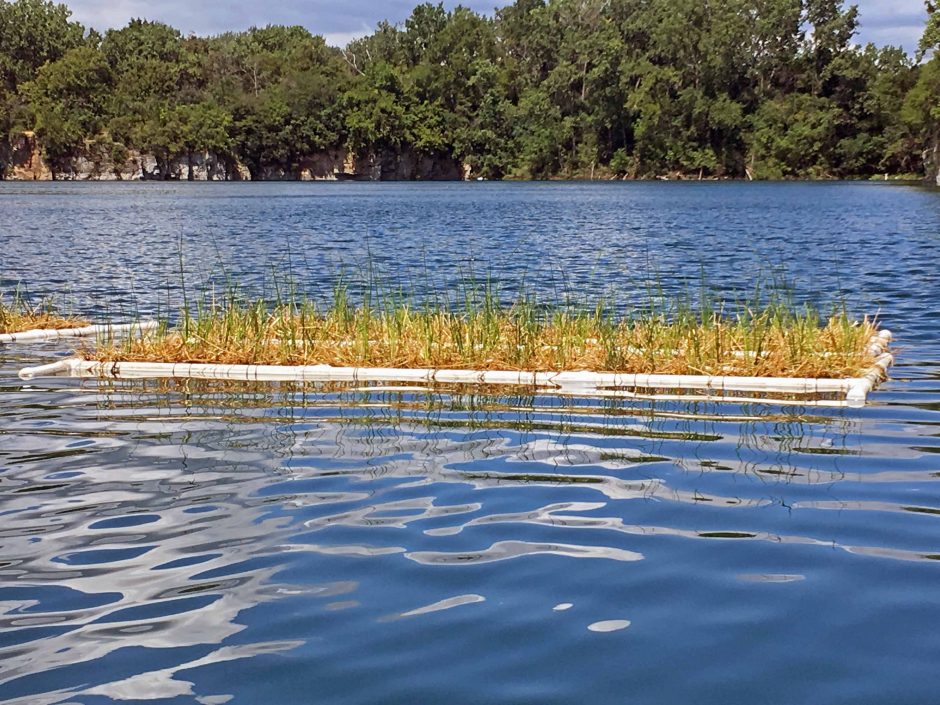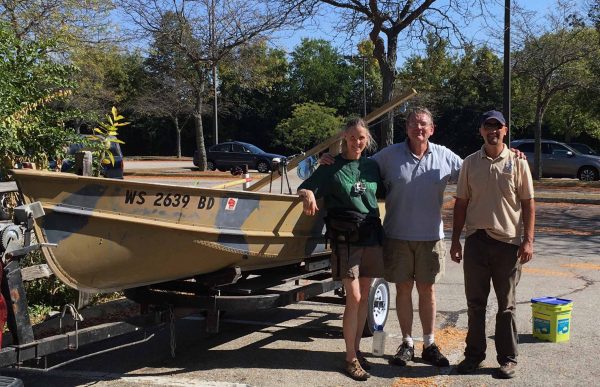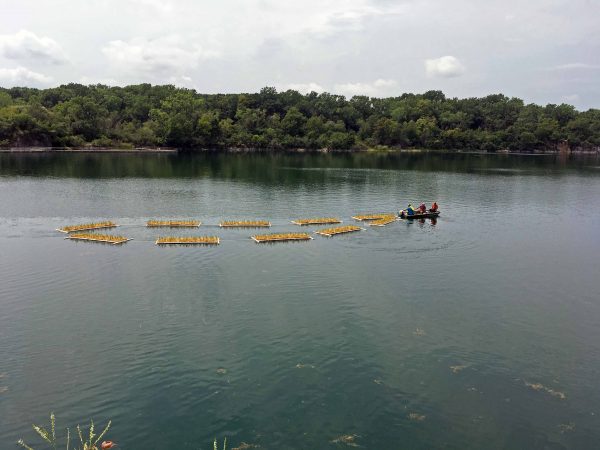Racine County Focuses on Natural Water Filtering

A floating island in Quarry Lake. (Credit: Ben Haas)
A water quality improvement and monitoring program kicked off with innovative, handmade floating islands in one Racine County, Wisconsin park.
Quarry Lake, located in Quarry Lake Park in the city of Racine and the village of Mount Pleasant, was originally a man-made limestone quarry but is now a spring-fed lake. It’s a popular location for swimming, scuba diving and fishing. For several decades, the lake experienced algae formation that can prevent its use for popular recreation activities.
Because of this, the county allocated a small amount of funding for studying and improving the lake’s water quality.
“There were a few options on the table, as far as how to improve the water quality,” said Ben Haas, a park manager for the Racine County Parks Department. “We wanted to focus on treating the water naturally. To get started, the County Board selected a plan developed by Dr. Stephen Lyon from SRL Environmental, University of Wisconsin-Parkside’s Professor Joy Wolf.”
The plan involved the incorporation of different natural methods for treating the water and converting the sediment. After coring, the sediment will be analyzed so that the researchers know the ideal amount of amendments to add for the conversion. Further down the line, the department will establish regular sampling of both the water and sediment.

Professor Joy Wolf, Dr. Stephen Lyon, and Ben Haas at Quarry Lake before launching floating islands. (Credit: Ben Haas)
The initial part of the plan involved the installation of floating islands of native bulrush plants at specific points throughout the lake. The plants are expected to naturally filter the sediment that is contributing to the algae problem. The floating islands are a low-cost, low-tech option, constructed by the parks department staff and volunteers from PVC pipes, milk crates and the bulrush plants.
Each floating island cost roughly $125.
Before selecting the locations for the floating islands, the park department conducted a bathymetry mapping exercise using Garmin Echomap Sonar data and ArcMap software. From that map, the department selected 10 locations best suited for the floating islands and installed them.
The mapping exercise also provided an important, in-depth look at the bottom of the lake and the sediment.
“We need to understand what is happening at the bottom of the lake to figure out what is contributing to the algae blooms,” said Haas. “We need to understand the sediment to know about the nutrient loads and minimize further algae occurrences.”

Floating islands are deployed on Quarry Lake in Racine County, Wisconsin. (Credit: Ben Haas)
The team was able to identify where to deploy the floating islands and the best locations to begin regularly sampling the water and the sediment. They will be taking samples from different locations, at different depths to get an accurate picture of what is happening in the water.
“We are trying to do two things. First, we want to provide Racine County with the best water quality data possible for decision making and that is why we are working to establish regular sampling practices,” said Haas. “Second, we want to prove that these natural methods, like the floating islands, are effective.”
To do this Lyon set up a method of testing the quality of the water going through the islands. After surrounding the floating islands with geotextiles, the team set up a solar-powered submersible pump to move water through the floating islands and test for total suspended solids at the beginning, middle, and end.
“Our hope is to gather enough data to show that the methods are effective. Hopefully, this will lead to more floating islands and people getting back to the lake,” said Haas.
Top image: A floating island in Quarry Lake. (Credit: Ben Haas)











Pingback: Racine County Focuses on Natural Water Filtering - Lake Scientist